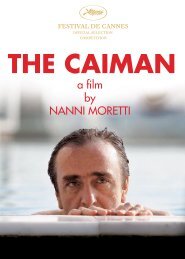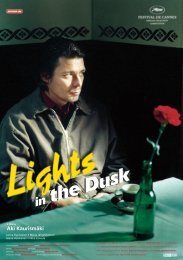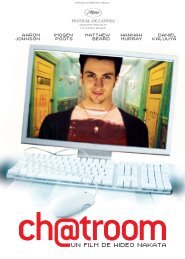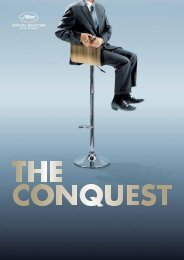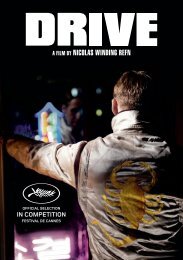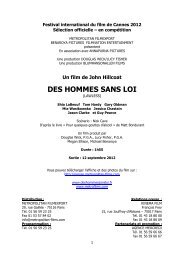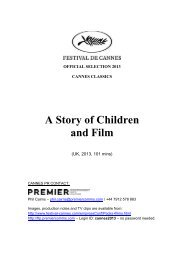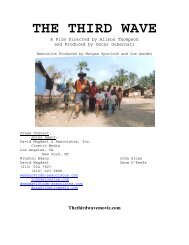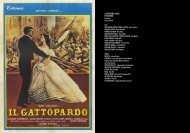dossier de presse - Cannes International Film Festival
dossier de presse - Cannes International Film Festival
dossier de presse - Cannes International Film Festival
Create successful ePaper yourself
Turn your PDF publications into a flip-book with our unique Google optimized e-Paper software.
« C’EST DUR D’ÊTRE AIMÉ PAR DES CONS »<br />
LE PROCÈS<br />
un fi lm <strong>de</strong> DANIEL LECONTE<br />
« IT’S HARD BEING LOVED BY JERKS »<br />
THE TRIAL<br />
a fi lm by DANIEL LECONTE
PRESSE<br />
Laurence Granec & Karine Ménard<br />
5 bis, rue Kepler - 75116 Paris<br />
T. 01 47 20 36 66<br />
F. 01 47 20 35 44<br />
lgranec@club-internet.fr<br />
CANNES<br />
Rési<strong>de</strong>nce du Gray d’Albion<br />
20 bis, rue <strong>de</strong>s Serbes - entrée D<br />
T. 04 93 68 17 84 / 04 93 68 19 33<br />
Laurence Granec 06 07 49 16 49<br />
Karine Ménard 06 85 56 22 99<br />
INTERNATIONAL PRESS IN CANNES<br />
ALIBI COMMUNICATIONS<br />
Brigitta Portier / Barbara Van Lombeek<br />
In <strong>Cannes</strong> : offi ce at Unifrance<br />
T. 0033 6 29607541<br />
5, rue du Chevalier <strong>de</strong> Saint George - 75008 Paris<br />
T. 01 42 96 01 01<br />
F. 01 40 20 02 21<br />
elagesse@pyrami<strong>de</strong>fi lms.com<br />
www.pyrami<strong>de</strong>fi lms.com<br />
WORLD SALES<br />
5, rue du Chevalier <strong>de</strong> Saint George<br />
75008 Paris<br />
T. 33(0) 1 42 96 02 20<br />
F. 33(0) 1 40 20 05 51<br />
yoann@pyrami<strong>de</strong>fi lms.com<br />
CANNES MARKET<br />
Riviera-F6<br />
T. 04 92 99 32 36<br />
FILM EN STOCK IN CANNES<br />
Raphaël Cohen, Élodie Polo, Chloé Blon<strong>de</strong>l<br />
Offi ce at Unifrance T. 0033 1 44 54 25 89<br />
FILM EN STOCK présente / presents<br />
SCÉANCE SPÉCIALE<br />
« C’EST DUR D’ÊTRE AIMÉ PAR DES CONS »<br />
LE PROCÈS<br />
un fi lm <strong>de</strong> DANIEL LECONTE<br />
« IT’S HARD BEING LOVED BY JERKS »<br />
THE TRIAL<br />
a fi lm by DANIEL LECONTE<br />
DURÉE / RUNNING TIME 118’<br />
PHOTOS & DOSSIER DE PRESSE TÉLÉCHARGEABLES SUR WWW.PYRAMIDEFILMS.COM
SYNOPSIS<br />
Pour avoir reproduit les douze caricatures danoises ayant<br />
déclenché la colère <strong>de</strong>s musulmans aux quatre coins<br />
du mon<strong>de</strong>, Philippe Val, le patron <strong>de</strong> Charlie Hebdo, journal<br />
satirique français, est assigné en justice par la Mosquée<br />
<strong>de</strong> Paris, la Ligue Islamique Mondiale et l’Union <strong>de</strong>s<br />
Organisations Islamiques <strong>de</strong> France.<br />
Un procès exeptionnel que Daniel Leconte suit en temps<br />
réel afin <strong>de</strong> décrypter avec les acteurs clés, les enjeux<br />
politiques internationaux, médiatiques et idéologiques.<br />
Avec en images : avocats, témoins, médias, conférences <strong>de</strong><br />
rédaction, manifestations <strong>de</strong> soutien… Avec aussi les prises<br />
<strong>de</strong> positions <strong>de</strong>s intellectuels et <strong>de</strong>s hommes politiques, les<br />
réactions <strong>de</strong> l’accusation et <strong>de</strong>s pays musulmans…<br />
Une réflexion sur l’Islam, sur la <strong>presse</strong>, sur l’état <strong>de</strong> l’opinion<br />
dans la société française mais aussi une tentative <strong>de</strong> réponse<br />
aux défis lancés par l’intégrisme à toutes les démocraties.<br />
Because he had published the twelve Danish cartoons that<br />
had triggered the wrath of Muslims worldwi<strong>de</strong>, Philippe Val,<br />
the editor of Charlie Hebdo, a French satirical newspaper,<br />
was cited to court by the Great Mosque of Paris, the World<br />
Muslim League and the Union of Islamic Organizations of<br />
France.<br />
Daniel Leconte has been covering this extraordinary<br />
trial in real time, aiming at <strong>de</strong>ciphering the international<br />
political, i<strong>de</strong>ological and media-related stakes with the key<br />
participants. The film features lawyers, witnesses, the media,<br />
editorial conferences, <strong>de</strong>monstrations of support... as well as<br />
the stances of intellectuals and politicians, the reactions of<br />
the prosecutors and of Muslim countries...<br />
A reflection on Islam, on the press, on the state of the public<br />
opinion in French society, but also an en<strong>de</strong>avor to answer the<br />
challenges that fundamentalism poses to all <strong>de</strong>mocracies.
NOTE D’INTENTION<br />
DE DANIEL LECONTE<br />
« MIEUX VAUT RIRE AVEC CHARLIE<br />
QUE S’EMMERDER AU PARADIS… »<br />
Paris 7 février 2007… Palais <strong>de</strong> justice <strong>de</strong> Paris, 7 heures du matin. Les forces<br />
<strong>de</strong> l’ordre sont sur les <strong>de</strong>nts… Devant les grilles, la foule <strong>de</strong>s grands jours...<br />
A l’intérieur, dans la salle <strong>de</strong>s pas perdus <strong>de</strong> la XVIIème chambre correctionnelle,<br />
<strong>de</strong>s centaines <strong>de</strong> journalistes venus du mon<strong>de</strong> entier et <strong>de</strong>s dizaines <strong>de</strong> chaînes télés<br />
(françaises et étrangères) sont sur le pied <strong>de</strong> guerre… Ils atten<strong>de</strong>nt les trois coups du<br />
procès intenté par la Mosquée <strong>de</strong> Paris, l’UOIF (Union <strong>de</strong>s Organisations Islamiques<br />
<strong>de</strong> France ) et la Ligue Islamique Mondiale contre l’hebdomadaire satirique Charlie<br />
Hebdo coupable à leurs yeux d’avoir reproduit trois caricatures du prophète<br />
Mahomet. Un <strong>de</strong>ssin qui représente le prophète avec une bombe dans son turban…<br />
Un autre : plusieurs terroristes qui arrivent encore tout fumant au paradis et à qui le<br />
prophète lance : « Stop ! le stock <strong>de</strong>s vierges est épuisé » tous <strong>de</strong>ux parus dans un<br />
journal danois, le Jyllands-Posten. Il y a aussi le <strong>de</strong>ssin <strong>de</strong> Cabu, en Une <strong>de</strong> Charlie<br />
Hebdo : « Mahomet débordé par les intégristes » et qui s’exclame effondré la tête<br />
entre les mains : « C’est dur d’être aimé par <strong>de</strong>s cons… ».<br />
Murmures, mouvements <strong>de</strong> foule… Dans la salle d’audience, les ténors du<br />
barreau font leur entrée. Pour les plaignants, Maître Szpiner, le « conseil » <strong>de</strong><br />
Jacques Chirac est l’avocat <strong>de</strong> la Mosquée <strong>de</strong> Paris. Avec lui, trois autres avocats<br />
engagés dans l’affaire. Pour Charlie Hebdo, Maître Kiejman, ancien ministre <strong>de</strong><br />
François Mitterrand. Il est assisté <strong>de</strong> Richard Malka. Derrière le Prési<strong>de</strong>nt et ses<br />
assesseurs, les <strong>de</strong>ssinateurs <strong>de</strong> Charlie, Cabu, Riss, Charb, Wolinski. Sur le banc<br />
<strong>de</strong>s accusés, Philippe Val, le patron <strong>de</strong> Charlie. Dans le public, Cavanna.<br />
Le procès va durer <strong>de</strong>ux jours. Deux jours pendant lesquels, les témoins viendront<br />
dire à la barre pourquoi ils sont là. Sont annoncés, Flemming Rose, François Hollan<strong>de</strong>,<br />
François Bayrou, Elizabeth Badinter, Clau<strong>de</strong> Lanzmann, Mehdi Mozaffari,<br />
Mohamed Sifaoui, Denis Jeambar etc. En tout, une douzaine <strong>de</strong> témoins français<br />
et étrangers…<br />
Un grand débat, avec <strong>de</strong>s acteurs à la hauteur <strong>de</strong>s enjeux … Liberté <strong>de</strong> la <strong>presse</strong><br />
contre délit <strong>de</strong> blasphème ! Coups <strong>de</strong> théâtres, effets <strong>de</strong> manches, échanges<br />
musclés, verbalement s’entend, dans la salle d’audience les bons mots fusent :<br />
« Il faudra vous habituer » lance Maître Szpiner « nous ne sommes plus les<br />
indigènes <strong>de</strong> la République ». « Nous n’avons pas <strong>de</strong> leçons à recevoir<br />
<strong>de</strong> vous. » répond Maître Kiejman « Vous avez organisé <strong>de</strong>s manifestations contre<br />
les caricatures, vous n’en avez jamais organisées contre Ben La<strong>de</strong>n ».<br />
L’humour, le meilleur antidote contre la peur quand la peur fait oublier les grands<br />
principes… « Nous ne réclamons pas <strong>de</strong> passe droit » poursuivent les avocats<br />
<strong>de</strong>s plaignants, « nous exigeons seulement la fin du <strong>de</strong>ux poids <strong>de</strong>ux mesures<br />
et l’égalité <strong>de</strong> traitement avec les autres religions ». Richard Malka évoque alors<br />
les 20 procès intentés par les « chrétiens », tous gagnés par Charlie Hebdo.<br />
Il montre les caricatures incriminées, ou encore la Une <strong>de</strong> Charlie « Bienvenue au<br />
pape <strong>de</strong> mer<strong>de</strong> ». La salle se tord <strong>de</strong> rire : « Vous voulez vraiment une égalité <strong>de</strong><br />
traitement ? » poursuit Maître Malka. « Jusqu’à maintenant, le traitement réservé<br />
aux chrétiens dans les pages <strong>de</strong> Charlie est dix fois plus injurieux que celui<br />
réservé aux musulmans. Mais si c’est ce que vous voulez, alors méfiez-vous, on<br />
va vous prendre au mot »…<br />
Un enjeu Universel… Considéré à tort au départ comme une affaire française,<br />
le procès se transforme très vite en enjeu planétaire avec au bout la réponse<br />
par le droit aux tentatives <strong>de</strong>s extrémistes musulmans d’imposer par la force<br />
leurs interdits religieux. Après l’affaire Idoménée en Allemagne, le meurtre <strong>de</strong><br />
Théo Van Gogh aux Pays Bas, après le renoncement <strong>de</strong> l’Europe à défendre<br />
ses principes quand au moment fort <strong>de</strong>s caricatures danoises, ses ambassa<strong>de</strong>s<br />
étaient mises à sac au Proche Orient, ce procès est un test pour la France, pour<br />
l’Europe, pour toutes les démocraties.
DIRECTOR’S NOTE<br />
OF DANIEL LECONTE<br />
« BETTER OFF LAUGHING WITH CHARLIE<br />
THAN GETTING BORED IN PARADISE!»<br />
Paris, February 7, 2007… Paris Court House, 7 AM. The police are on their edge.<br />
In front of the portal, it’s big day affluence… Insi<strong>de</strong>, in the waiting room of the<br />
17th Correctional Chamber, hundreds of journalists from all over the world and<br />
dozens of TV networks, French and foreign, are on a war footing. They are<br />
waiting for the three-knock signal of the opening of the trial brought by the Paris<br />
Mosque, the Union of Islamic Organizations in France and the Muslim World<br />
League against the satirical weekly newspaper Charlie Hebdo, guilty in their<br />
eyes of publishing three cartoons of Prophet Muhammad. One cartoon shows<br />
the Prophet with a bomb in his turban, another one shows several terrorists<br />
arriving, still in fumes, to Paradise and to whom the Prophet cries “Stop, we<br />
ran out of virgins!” Both were published in a Danish newspaper, the Jyllands-<br />
Posten. There is also Cabu’s cartoon, published on the front page of Charlie<br />
Hebdo, titled “Muhammad overwhelmed by fundamentalists” and showing the<br />
Prophet, head in hands, saying “It’s hard being loved by jerks”.<br />
Murmurs and bustling in the crowd … In the court room, the leading lights of<br />
the bar make their entry. Defending the plaintiffs, Francis Spizner, the counsel<br />
of Jacques Chirac, is the lawyer of the Paris Mosque. Three other lawyers<br />
involved in the case follow him. Defending Charlie Hebdo, Georges Kiejman,<br />
former Minister of François Mitterand. He is assisted by Richard Malka. Behind<br />
the Judge and his assistants, the Charlie Hebdo cartoonists, Cabu, Riss, Charb,<br />
Wolinski. On the <strong>de</strong>fendant’s bench, Philippe Val, the editor in chief of Charlie<br />
Hebdo. In the audience, Cavanna.<br />
The trial is set to last for two days. Two days during which witnesses will come<br />
to the stand and explain why they are here. Flemming Rose, François Hollan<strong>de</strong>,<br />
François Bayrou, Elizabeth Badinter, Clau<strong>de</strong> Lanzmann, Mehdi Mozaffari,<br />
Mohamed Sifaoui, Denis Jeambar are expected. There will be 12 French and<br />
foreign witnesses…<br />
A great <strong>de</strong>bate, with participants matching up the stakes. Freedom of the<br />
press against the offence of blasphemy! Dramatic turns, arm-waving for<br />
grandstanding, strong arguments – verbal, of course … Finely crafted words<br />
are heard throughout the court room: “You’ll have to get used to it!” Francis<br />
Spizner says. “We are no longer the Indigenes of the Republic!” “You are no<br />
teacher to tell us any lesson”, Georges Kiejman answers. “You have organized<br />
protests against the cartoons, yet never a single one against Bin La<strong>de</strong>n”.<br />
Humor, the best antidote to fear, when fear drives people to forget the great<br />
principles.“We are not asking for any preferential treatment”, the lawyers of<br />
the plaintiffs continue, “We are only calling for the end of double standards and<br />
for an equality of treatment compared to other religions”. Then Richard Malka<br />
recalls the 20 cases brought to court by “Christians”, all of which were won by<br />
Charlie Hebdo. He shows the relevant cartoons, as well as a front page of Charlie<br />
showing “Welcome to this shitty Pope”. The audience bursts out in laughter:<br />
“Do you really want equality of treatment?” Malka says. “Until now, Christians<br />
have been treated 10 times more insultingly by Charlie than Muslims. But be<br />
careful, if that is what you really want, we’ll take your word for it!”<br />
A universal stake Wrongly regar<strong>de</strong>d at the beginning as a purely French<br />
case, the trial is very quickly transformed into a universal stake with, at the<br />
end, a legal response to attempts by Muslim fundamentalists of imposing<br />
their proscriptions by force. After the Idomenea case in Germany, after the<br />
assassination of Theo van Gogh in the Netherlands, after the EU renunciation<br />
to fight for its principles when, at the highest of the Danish cartoons scandal, its<br />
embassies were ransacked in the Middle East, this trial is a test for France, for<br />
Europe, for every <strong>de</strong>mocracy out there.
ENTRETIEN AVEC<br />
DANIEL LECONTE<br />
PROPOS RECUEILLIS PAR ALEX MASSON<br />
Avant même <strong>de</strong> réaliser C’EST DUR D’ÊTRE AIMÉ PAR DES CONS, vous avez<br />
été impliqué dans le procès <strong>de</strong> Charlie Hebdo et <strong>de</strong>s caricatures.<br />
Quelques mois avant le procès, j’ai été alerté par Philippe Val. C’était au moment<br />
où Charlie Hebdo était menacé d’interdiction à l’occasion <strong>de</strong> la publication <strong>de</strong><br />
ces fameuses caricatures. J’ai écrit pour les pages Rebonds <strong>de</strong> Libération, un<br />
texte, intitulé Merci Charlie, où j’expliquais pourquoi il était important que cet<br />
hebdomadaire ait relevé la tête dans ce contexte. A la suite <strong>de</strong> cette parution,<br />
Philippe Val m’a appelé pour me remercier. Il en a profité pour me <strong>de</strong>man<strong>de</strong>r si<br />
je voulais bien être témoin à leur procès. Dans un premier temps, je lui répondu<br />
ne pas me sentir vraiment <strong>de</strong> légitimité pour cela, mais qu’on pouvait en parler.<br />
Quoi qu’il en soit, j’étais prêt à soutenir, auprès <strong>de</strong>s chaines <strong>de</strong> télévision, l’idée<br />
d’un film sur le procès. Je l’ai fait. Toutes se sont curieusement désistées.<br />
Val m’a alors fait remarquer que j’avais là, la matière première <strong>de</strong> mon<br />
intervention au procès ; ne serait-ce que pour expliquer <strong>de</strong>vant un tribunal que<br />
les médias français refusaient d’abor<strong>de</strong>r le problème. Alors j’ai dit oui.<br />
C’EST DUR D’ÊTRE AIMÉ PAR DES CONS est réalisé à la fois en aval, avec <strong>de</strong>s<br />
témoignages recueillis après, et en amont du procès où vous suivez l’équipe <strong>de</strong><br />
Charlie Hebdo. Pourquoi ce choix ?<br />
A partir du moment où je savais qu’il ne me serait pas permis <strong>de</strong> tourner dans<br />
la salle d’audience, la forme <strong>de</strong> ce documentaire s’est imposée d’elle-même.<br />
Il n’y avait que trois conditions : tourner avant le procès, après le procès et<br />
dans la salle <strong>de</strong>s pas perdus du tribunal. Avec ces trois éléments, j’avais mon<br />
théâtre, qui permettait <strong>de</strong> construire la dramaturgie du film. Le problème, <strong>de</strong><br />
taille, c’est qu’il me manquait la salle d’audience. Il fallait donc restituer d’une<br />
manière ou d’une autre ce formidable débat qui s’y était déroulé. Je n’avais<br />
qu’une seule certitu<strong>de</strong> : je ne voulais aucun artifice dans la captation <strong>de</strong> la<br />
parole <strong>de</strong>s protagonistes, <strong>de</strong>s témoins, <strong>de</strong>s avocats et <strong>de</strong>s magistrats, genre<br />
par exemple docu-fiction. Tout <strong>de</strong>vait donc se jouer lors <strong>de</strong>s entretiens. J’ai<br />
<strong>de</strong>mandé la transcription <strong>de</strong>s débats afin <strong>de</strong> remettre mes interlocuteurs en<br />
situation au moment du tournage, pour qu’ils me répon<strong>de</strong>nt au plus près <strong>de</strong>s<br />
termes utilisés pendant les audiences, mais aussi pour le climat <strong>de</strong>s échanges,<br />
jusque dans les attitu<strong>de</strong>s.<br />
L’enjeu n’est pourtant alors plus le même : lors <strong>de</strong> ces entretiens, l’issue du<br />
procès est connue. Pensez-vous que cela a contribué à leur ton assez allègre,<br />
presque amusé ?<br />
Premièrement, ces entretiens témoignent <strong>de</strong> l’ambiance <strong>de</strong>s audiences qui<br />
a parfois viré à la franche rigola<strong>de</strong>. De ce point <strong>de</strong> vue, les entretiens sont<br />
d’ailleurs plutôt en-<strong>de</strong>çà. La plaidoirie <strong>de</strong> Richard Malka, l’avocat du journal,<br />
s’est réellement passée comme elle est décrite, avec <strong>de</strong> vrais éclats <strong>de</strong> rire. Celle<br />
<strong>de</strong> Me Kiejman aussi, qui sur un mo<strong>de</strong> très brillant, « draguait » la procureure<br />
ou « menaçait » le prési<strong>de</strong>nt, ce qui a provoqué <strong>de</strong>s secousses <strong>de</strong> rire jusque<br />
chez les magistrats ou les plaignants. Cette dimension là se <strong>de</strong>vait d’apparaître<br />
dans le film.<br />
Deuxièmement, c’est l’esprit <strong>de</strong> Charlie Hebdo qui était en jeu, cet esprit<br />
particulier qui consiste à mener la charge avec l’humour comme arme <strong>de</strong><br />
<strong>de</strong>struction massive <strong>de</strong> la bêtise. Il m’était difficile <strong>de</strong> ne pas rester dans ce<br />
registre-là. Il n’en était d’ailleurs pas question puisque c’était le registre <strong>de</strong><br />
Charlie : un concentré <strong>de</strong> « l’esprit français » dans ce qu’il a <strong>de</strong> meilleur, à
la fois profond et pétillant d’intelligence. Comme une façon d’introduire <strong>de</strong> la<br />
distance, un peu <strong>de</strong> légèreté dans une affaire qui au fond, est très grave.<br />
Ce qui déplace ce qu’on pourrait penser être l’objet du film (le procès) vers une<br />
cause commune aux <strong>de</strong>ux parties…<br />
Le principe, mais aussi la difficulté du film, était <strong>de</strong> revisiter le procès en<br />
connaissant d’avance son issue. Il fallait donc constamment se faire violence<br />
pour rester dans les faits et évacuer le commentaire. Je voulais aussi que les<br />
protagonistes soient <strong>de</strong>s protagonistes et en même temps les acteurs d’une<br />
aventure collective. Les <strong>de</strong>ux parties adverses ont en effet construit, au-<strong>de</strong>là<br />
<strong>de</strong> la scénographie judiciaire, un espace <strong>de</strong> dialogue démocratique pour régler<br />
un problème qui divisait la société française. Et au-<strong>de</strong>là, toutes les sociétés<br />
démocratiques occi<strong>de</strong>ntales confrontées à la question <strong>de</strong> l’intégrisme et du<br />
terrorisme. Ce procès n’était pas un règlement <strong>de</strong> compte. C’était l’occasion <strong>de</strong><br />
porter le débat au niveau le plus sophistiqué qu’il soit, afin qu’il puisse entrer<br />
en résonance avec les valeurs <strong>de</strong> la république et <strong>de</strong> la laïcité. C’est cela la<br />
mo<strong>de</strong>rnité du procès et son caractère exceptionnel. Après le verdict, Maître<br />
Szpiner, l’avocat <strong>de</strong>s plaignants, nous a d’ailleurs expliqué en quoi finalement,<br />
il avait rendu service à Charlie Hebdo en acceptant <strong>de</strong> défendre la Mosquée<br />
<strong>de</strong> Paris dans ce procès. Même si je ne suis pas sûr que c’était son intention<br />
initiale, au final, il n’avait pas tort : sans procès, il n’y aurait eu ni débat <strong>de</strong> cette<br />
qualité, ni jurispru<strong>de</strong>nce. Alors au bout du compte, oui merci à la Mosquée <strong>de</strong><br />
Paris.<br />
La salle <strong>de</strong>s pas perdus, elle, en prise directe avec le procès, est un contrepoint<br />
très important. Pourquoi lui avoir donné une telle présence ?<br />
Parce qu’elle représentait la Vox populi, où si vous préférez un forum brut, sans<br />
parole policée. Sans compter que cette salle était comme un lieu fort du procès,<br />
c’est là que ressortaient les témoins après les audiences. Ce qui amenait <strong>de</strong>s<br />
niveaux <strong>de</strong> parole différents, l’un à la justice, l’autre à l’opinion.<br />
Cette parole aurait pu être biaisée : vous interviewez moins <strong>de</strong> personnes du<br />
camp <strong>de</strong>s plaignants que <strong>de</strong> celui <strong>de</strong> Charlie Hebdo.<br />
Ce n’est pas <strong>de</strong> ma faute si les plaignants n’ont présenté qu’un seul témoin et<br />
Charlie Hebdo une douzaine. Et puis en toute objectivité, les prestations lors<br />
du procès étaient bien plus convaincantes du côté <strong>de</strong> Charlie Hebdo. Quant<br />
aux avocats, je ne crois pas qu’on puisse dire que Maître Szpiner, l’avocat <strong>de</strong> la<br />
Mosquée <strong>de</strong> Paris au <strong>de</strong>meurant très pugnace, est moins présent dans ce film<br />
que Maître Kiejman ou Maître Malka.<br />
Il y a eu <strong>de</strong>s témoins très importants à cette pério<strong>de</strong>, puisque le procès se<br />
déroulait en pleine campagne pour l’élection prési<strong>de</strong>ntielle : <strong>de</strong>s personnalités<br />
politiques se sont exprimées <strong>de</strong> manières diverses…<br />
Cela a contribué à la portée universelle <strong>de</strong> ce procès : portés par le moment,<br />
les politiques se sont sentis obligés <strong>de</strong> se prononcer sur le sujet. Cela a été le<br />
cas avec François Hollan<strong>de</strong>. A un moment <strong>de</strong> son entretien, François Bayrou <strong>de</strong><br />
son côté résume bien les enjeux en disant que ce procès a permis <strong>de</strong> rappeler<br />
pour les musulmans, les fondamentaux entre religion et politique définis pour<br />
les catholiques <strong>de</strong>puis la loi <strong>de</strong> séparation <strong>de</strong> l’Eglise et <strong>de</strong> l’Etat c’est à dire<br />
il y a plus d’un siècle. Pas mal non ? Quant à l’intervention par fax <strong>de</strong> Sarkozy<br />
pour soutenir Charlie Hebdo contre les associations musulmanes, elle prend un<br />
certain relief aujourd’hui qu’on connaît ses positions contestées sur la laïcité.<br />
Avec quand même un absent <strong>de</strong> taille : Jacques Chirac, alors prési<strong>de</strong>nt en<br />
exercice.<br />
Pas tant que ça : il était en arrière-plan via la présence <strong>de</strong> son propre avocat,<br />
Me Szpiner qui, j’en suis sûr a agit en son nom, même s’il ne l’a pas fait<br />
ouvertement. Le souci <strong>de</strong> Chirac à ce moment précis était qu’aucun ressortissant<br />
français vivant à l’étranger et en particulier dans les pays arabes ne soit<br />
maltraité à cause <strong>de</strong> la publication <strong>de</strong>s caricatures. Il <strong>de</strong>vait, m’a t-on précisé <strong>de</strong><br />
source sûre <strong>de</strong>puis, donner un signal fort aux populations arabo-musulmanes<br />
en rappelant qu’à travers Charlie Hebdo, ce n’était pas toute la population<br />
française qui s’exprimait, en tous cas pas le pouvoir en place qui se <strong>de</strong>vait <strong>de</strong><br />
protéger une population qui se sentait bafouée dans ses croyances. On n’est<br />
pas forcé d’être d’accord et je ne le suis pas. Mais je peux comprendre ce qui l’a<br />
guidé dans cette affaire.<br />
Autres mis en cause dans votre documentaire : les médias, dont certains<br />
semblent s’être autocensurés.<br />
Le discours dominant pour les déci<strong>de</strong>urs dans les médias a longtemps été <strong>de</strong><br />
croire qu’à partir du moment où on traite mal les poseurs <strong>de</strong> bombes, on traite<br />
mal tous les musulmans. C’est absur<strong>de</strong> et méprisant pour la gran<strong>de</strong> majorité<br />
<strong>de</strong>s musulmans. Cela revient finalement à ne faire aucune différence entre les<br />
musulmans et les poseurs <strong>de</strong> bombes ! C’est un peu comme si condamner<br />
les assassins d’enfants c’était condamner l’ensemble du genre humain. Je me<br />
<strong>de</strong>man<strong>de</strong> parfois quel <strong>de</strong>gré <strong>de</strong> naufrage intellectuel nous avons atteind pour<br />
en arriver là !<br />
Reprenons les événements : quand FranceSoir publie les caricatures, son<br />
directeur est licencié ; quand L’Express les publie à son tour, le journal est<br />
revendu quelques mois plus tard par son propriétaire. Il ne reste que Charlie<br />
Hebdo, incontrôlable <strong>de</strong> par son indépendance. Qui sera donc le seul titre à<br />
être attaqué. Là-<strong>de</strong>ssus se rajoute l’histoire <strong>de</strong> la conception <strong>de</strong> ce film, dont<br />
aucun média n’a voulu. Si je n’avais pas décidé d’y aller malgré tout, avec<br />
quelques jeunes journalistes enthousiastes et une caméra PD 150, il n’aurait<br />
jamais existé ! Je voudrais d’ailleurs rendre hommage à ceux qui n’ont pas<br />
cédé. D’abord Charlie bien sûr. Des jeunes <strong>de</strong> Doc en Stock qui sont partis sur<br />
le coup sans garantie aucune. Canal + Cinéma qui par la suite nous a rejoint.<br />
Fabienne Vonier et Eric Lagesse <strong>de</strong> Pyrami<strong>de</strong> qui nous ont fait confiance. Et<br />
pour finir, <strong>Cannes</strong> qui nous accueille. Cela veut dire que rien n’est perdu même<br />
quand les grands médias réagissent par la peur. Je suis très touché par cette<br />
capacité <strong>de</strong> résistance. C’est rassurant !<br />
Mais c’est vrai, ce film parle en filigrane <strong>de</strong> l’autocensure d’une gran<strong>de</strong> partie <strong>de</strong><br />
la <strong>presse</strong>. Comme si on avait désormais peur <strong>de</strong> ses convictions, <strong>de</strong> ses propres<br />
valeurs qu’on psalmodie tous les jours mais qui restent en ra<strong>de</strong> quand il s’agit <strong>de</strong><br />
passer à l’acte. On a besoin <strong>de</strong> journalistes impertinents, indépendants comme<br />
ceux <strong>de</strong> Charlie Hebdo. Quand la machine s’enraye et que nous, journalistes,<br />
nous réfugions dans le conformisme <strong>de</strong>s idées ou dans <strong>de</strong>s combats contre <strong>de</strong>s<br />
moulins à vent en faisant croire le contraire, nous oublions ce qui fait l’intérêt<br />
<strong>de</strong> ce métier : dire les choses surtout si elles fâchent et jouer avec les lignes<br />
s’il le faut. Quand la justice française relaxe Charlie Hebdo, elle légitime son
combat. C’est fondamental, car ça peut donner <strong>de</strong>s envies <strong>de</strong> se battre aux<br />
médias allemands, anglais ou danois.<br />
Au final, vous n’avez donc aucun doute. Vous épousez le point <strong>de</strong> vue <strong>de</strong><br />
Charlie Hebdo ?<br />
Pendant le procès oui, mais pas dans le film. Mais je sais aussi que si ce ne sont<br />
pas les journalistes ou Charlie Hebdo qui mettent ce débat sur la table, ce sera<br />
l’extrême droite qui s’en chargera. Il est donc important que les démocrates<br />
s’emparent <strong>de</strong> cette question. Si l’on est plus capable <strong>de</strong> la traiter comme Charlie<br />
Hebdo le fait ou autrement, peu importe, mais en respectant nos valeurs, on<br />
peut craindre que ça tourne vinaigre comme c’est le cas en Hollan<strong>de</strong> avec un<br />
Geert Wil<strong>de</strong>rs actuellement.<br />
« Faut pas dire ceci et pas dire cela parce que sinon on risque <strong>de</strong>… ». A force <strong>de</strong><br />
ne pas dire ceci ou cela, on sait où ça mène… C‘est à dire à traiter le problème<br />
quand il est trop tard. C’est justement ce qu’il faut éviter si on ne veut pas être<br />
entraînés dans le « conflit <strong>de</strong>s civilisations ».<br />
Le message que je retiens <strong>de</strong> ce film est énoncé par Val quand il dit que quand<br />
les gens l’arrêtent dans la rue, ce n’est pas pour lui parler <strong>de</strong>s caricatures mais<br />
pour lui rappeler combien la liberté d’expression est nécessaire.<br />
BIOGRAPHIE DE<br />
DANIEL LECONTE<br />
Réalisateur, producteur et écrivain, Daniel LECONTE est lauréat<br />
<strong>de</strong>s Prix Albert Londres (1988) et <strong>de</strong>s Droits <strong>de</strong> l’homme (1982).<br />
Daniel LECONTE a également réalisé <strong>de</strong> nombreux films<br />
documentaires diffusés en France et à l’étranger, parmi lesquels :<br />
LA DEUXIÈME VIE DE KLAUS BARBIE, 1986 (Bolivie)<br />
LE RÊVE PERDU DE NICOLAS VASSILIÉVITCH KAZAKOV, 1991 (URSS)<br />
LES AMANTS DE TOKYO BAY, 1992 (Japon)<br />
LE MONDE SELON BOUDDHA, 1993 (Tibet-In<strong>de</strong>)<br />
MY NAME IS ANGIE, 1994 (France)<br />
BONS BAISERS DE BERLIN, 1995 (Allemagne)<br />
BORIS ELTSINE, L’ENFANCE D’UN CHEF, 2001 (France)<br />
UNITED WE STAND, 2001 (USA)<br />
AFGHANISTAN LA GUERRE POUR DE VRAI, 2002 (France)<br />
coréalisé avec Damien Degueldre<br />
FIDEL CASTRO, ENFANCE D’UN CHEF, 2004 (France)
INTERVIEW WITH<br />
DANIEL LECONTE<br />
BY ALEX MASSON<br />
Even before you filmed IT’S HARD BEING LOVED BY JERKS, you had been<br />
involved into the trial of Charlie Hebdo about the cartoons.<br />
A few months before the trial, I had been alerted by Philippe Val. That was the<br />
time when Charlie Hebdo was threatened by a seizure related to the publishing<br />
of the cartoons. I wrote a paper for the op-ed page of Libération, titled Thank<br />
You Charlie, in which I explained why it was so important that this newspaper<br />
had refused to resign in such a context. After this article, Philippe Val called<br />
me to thank me and he asked whether I would accept to testify at their trial.<br />
At first, I answered that I didn’t feel legitimate enough to do that, but that we<br />
could discuss it. Anyway, I was ready to support the i<strong>de</strong>a of a film about the trial<br />
towards the TV networks, and I did. Curiously, all of them stood down. Then<br />
Val ma<strong>de</strong> me notice that I had first-hand material in there for my testimony at<br />
the trial: I could explain before court that the French media refused to tackle the<br />
matter. Then I said yes.<br />
IT’S HARD BEING LOVED BY JERKS is filmed both downstream the trial, with<br />
testimonies collected after the ruling, and upstream while you follow the<br />
Charlie Hebdo team. Why did you make this choice?<br />
From the moment I knew that I wouldn’t be allowed to film in court, this form<br />
was self-imposed. There were only three conditions: to film before the trial, after<br />
the trial and in the waiting hall of the court house. Those three elements shaped<br />
my theatre and allowed me to build the dramaturgy of my film. There was one<br />
big problem: I lacked the court room. Thus, it was necessary to recreate, one<br />
way or another, the formidable <strong>de</strong>bate that had taken place there. I had only one<br />
certainty: I wanted no artifice in the way that the words of the stakehol<strong>de</strong>rs –<br />
witnesses, lawyers and magistrates – would be recor<strong>de</strong>d, such as those found<br />
in drama-documentaries. As such, interviews were crucial. I asked for the<br />
verbatim report of the <strong>de</strong>bates in or<strong>de</strong>r to put interviewees back in situation<br />
while I was filming, in or<strong>de</strong>r to get answers as close as possible to what they<br />
said in court, but also in or<strong>de</strong>r to recreate the ambience of court <strong>de</strong>bates, up<br />
into their attitu<strong>de</strong>s.<br />
But the stakes were no longer the same: during the interviews, the court<br />
rulings were known. Do you think that it was a factor in their light-hearted<br />
tone, nearly amused?<br />
First, these interviews reveal the true ambience in court, which sometimes<br />
turned to really good laugh. From that point of view, the interviews are even<br />
somewhat low-key. The plea of Richard Malka, Charlie Hebdo’s lawyer, really<br />
happened as it is <strong>de</strong>scribed, with actual bursts of laughter; and this is also true<br />
for the plea of Georges Kiejman who, with much brilliance, was “courting” the<br />
prosecutor or “threatening” the judge, which provoked outbursts of laughter<br />
even from the magistrates or the plaintiffs. That part of the court hearings<br />
nee<strong>de</strong>d to appear in the film.<br />
Second, the very spirit of Charlie Hebdo was at stake, this specific spirit which<br />
consists in attacking with humor as a weapon of mass <strong>de</strong>struction against<br />
stupidity. It was difficult for me to <strong>de</strong>part from this register. Anyway, it was not<br />
even possible to consi<strong>de</strong>r <strong>de</strong>parting from what is the true register of Charlie<br />
Hebdo, a concentrate of the best “French spirit”, both <strong>de</strong>ep and sparkling with<br />
wit. It was a way to introduce some distance and light-heartedness in a case<br />
which is actually very serious.
This is shifting what we could think of being the subject of the film (the trial)<br />
towards a cause shared by the parties…<br />
The principle, but also the great difficulty of the film, was to review the trial<br />
while its issue was known from the start. And it was necessary to force<br />
ourselves throughout the film to avoid shifting from the facts and to shrug<br />
off commentaries. I also wanted the stakehol<strong>de</strong>rs to be both the stakehol<strong>de</strong>rs<br />
and the participants into a collective adventure. The two opposite parties have<br />
actually built, beyond the setting of justice courts, a place for <strong>de</strong>mocratic <strong>de</strong>bate<br />
in or<strong>de</strong>r to tackle an issue which was parting the French society. And beyond,<br />
parting all Western <strong>de</strong>mocratic societies which are facing the problem of<br />
fundamentalism and terrorism. This trial was not a settling of scores. It was an<br />
opportunity to voice the <strong>de</strong>bate at the highest possible level, in or<strong>de</strong>r to create<br />
a resonance with the values of the Republic and of secularity. Therein lies the<br />
mo<strong>de</strong>rnity of this trial and its unique character. After the ruling, Francis Spizner,<br />
the lawyer of the plaintiffs, did explain us how he had eventually served Charlie<br />
Hebdo by <strong>de</strong>fending the Paris Mosque in the case. While I am unsure whether<br />
this was his initial intent, he was right in the end: without the trial, there would<br />
not have been a <strong>de</strong>bate of such quality, neither the setting of a legal prece<strong>de</strong>nt.<br />
So in the end, yes, we can thank the Paris Mosque!<br />
The waiting room of the Court House, in prime interaction with the trial, is a<br />
major counterpoint. Why did you give it such presence in the film?<br />
I did so because the waiting room represented the Vox Populi, or, if you prefer, a<br />
forum for raw and free speech. Besi<strong>de</strong>s, this room was a high place for the trial,<br />
it is where the witnesses went out after the hearings. This brought different<br />
speech levels: one from the justice, another from the opinion.<br />
This speech might have been biased. You interviewed less people from the<br />
plaintiff’s camp than from Charlie Hebdo’s.<br />
It’s not my fault if the plaintiffs brought a single witness and Charlie Hebdo a<br />
dozen. And, in full objectivity, the testimonies were much more convincing on<br />
Charlie Hebdo’s si<strong>de</strong>. As for the lawyers, I don’t think one can say that Francis<br />
Spizner, the lawyer of the Paris Mosque, and a very pugnacious one, is less<br />
present in the film than Georges Kiejman or Richard Malka.<br />
There were major witnesses at that time, since the trial occurred in the heart<br />
of the French presi<strong>de</strong>ntial race. There were political figures, who spoke up in<br />
different ways…<br />
This contributed to the universal reach of this trial: taken into the flow, politicians<br />
felt that they had to take a stance on the subject. This was the case with Francois<br />
Hollan<strong>de</strong>. During his interview, Francois Bayrou did a good sum up of the stakes<br />
by saying that this trial remin<strong>de</strong>d the Muslim community of the fundamentals<br />
of relations between religion and politics, <strong>de</strong>fined for the Catholics at the time<br />
of the Law on Separation of Church and State, more than a century ago. And<br />
that’s a good thing, isn’t it?<br />
As for Sarkozy’s intervention - which he sent by fax – in support of Charlie Hebdo<br />
against Muslim organizations, it is all the more interesting today knowing the<br />
man’s controversial stances on secularity.<br />
With, somehow, a major absentee : Jacques Chirac, the Presi<strong>de</strong>nt at the time<br />
of the trial.<br />
Not that much absent: he was in the background through the presence of Francis<br />
Spizner, his personal counsel, who I’m sure acted in his name, even if he didn’t<br />
say it openly. Chirac’s preoccupation at that time was that no French person<br />
living abroad, and especially in Arab countries, should be mistreated because<br />
the cartoons had been published. A reliable source has confirmed since that he<br />
had to give a strong signal to Arabic-Muslim people by reminding that the voice<br />
of Charlie Hebdo was not the one of the whole French population, at least, not<br />
the voice of the political power of the time who thought necessary to protect a<br />
society which felt that their beliefs were scorned. Nobody has to agree with this<br />
stance, and I don’t. But I can un<strong>de</strong>rstand what gui<strong>de</strong>d Chirac through the case.<br />
The media are also pointed at in your film, some of them seem to have censored<br />
themselves.<br />
The prevailing stance for media <strong>de</strong>cision-makers has long been the belief that<br />
from the moment terrorists are mistreated, then all Muslims are mistreated.<br />
This is absurd and insulting for the overwhelming majority of Muslims. In the<br />
end, it comes to making no difference between Muslims and terrorists! It would<br />
be similar to say that con<strong>de</strong>mning children mur<strong>de</strong>rers is con<strong>de</strong>mning Mankind<br />
as a whole. I won<strong>de</strong>r how <strong>de</strong>ep we have sunk to come to this!<br />
Let’s recollect the events: after the French daily newspaper France-Soir<br />
had published the cartoons, its director was fired; and the outcome of their<br />
publishing by the French weekly newspaper L’Express was its sale by its owners<br />
a few months later. Only the French weekly newspaper Charlie Hebdo cannot be<br />
controlled because it is in<strong>de</strong>pen<strong>de</strong>nt. And as such, it was the only newspaper to<br />
be brought to court. Over the top, there is the story of the genesis of this film,<br />
which every media refused. If I had not <strong>de</strong>ci<strong>de</strong>d to do it in the end, with a handful<br />
of young enthusiastic journalists and a PD150 hand-held camera, it would never<br />
have existed! By the way, I would like to salute all of those who did not give<br />
in. First of all, Charlie Hebdo of course. Young people from Doc en Stock who<br />
began to work immediately without any guarantee. Canal Plus Cinema who<br />
joined us later. Fabienne Vonnier and Eric Lagesse from the Pyrami<strong>de</strong> company<br />
who trusted us. And in the end, the <strong>Cannes</strong> <strong>Film</strong> <strong>Festival</strong> where we are guests.<br />
This means that nothing is lost even when the mainstream media react with<br />
fear. I am very moved by this ability to resist, it’s reassuring!<br />
But it’s true that this film tackles implicitly the self-censorship of a big part of the<br />
press. As if people were afraid of their own convictions, of their own values that<br />
are chanted and chanted every day but left untouched when it’s about action.<br />
We need impertinent, in<strong>de</strong>pen<strong>de</strong>nt journalists like the people at Charlie Hebdo.<br />
When the machine gets stuck and that we, journalists, shelter into conformity or<br />
into fighting against windmills, pretending the contrary, then we are forgetting<br />
what this job is about: telling the truth, especially if it is controversial, and<br />
shifting the lines if nee<strong>de</strong>d. When the French justice dismissed Charlie Hebdo,<br />
it legitimized their fight. This is crucial, because it can propagate the will to fight<br />
to the German, English or Danish media.<br />
In the end, you have no doubt. You adopt Charlie Hebdo’s stance.<br />
During the trial, I did. But I did not in the film. I also know that if journalists or if<br />
Charlie Hebdo don’t come up with this <strong>de</strong>bate, the far-right will. It is thus very
important that <strong>de</strong>mocrats take interest in this issue. If we are unable to treat<br />
it the way Charlie Hebdo did – or another way, no matter, but respecting our<br />
values - then we may fear that things turn sour, as they are currently doing in<br />
the Netherlands with Geert Wil<strong>de</strong>rs.<br />
“We can’t say this or that because we risk…” We know where keeping silence<br />
over this or that will lead us… That is, tackling the issue when it’s too late. This<br />
is exactly what we need to avoid if we don’t want to be dragged into the “clash<br />
of civilizations”.<br />
The message that I will remember from this film is carried out by Val when he<br />
says that people stop him in the street, not to talk to him about the cartoons but<br />
to say again how necessary freedom of speech is.<br />
BIOGRAPHY OF<br />
DANIEL LECONTE<br />
Director, producer and writer, Daniel LECONTE has been awar<strong>de</strong>d with<br />
the Albert Londres Prize (1988) and the Human Rights Prize (1982).<br />
Daniel LECONTE has also directed numerous documentaries<br />
broadcasted in France and abroad, including:<br />
THE SECOND LIFE OF KLAUS BARBIE, 1986 (Bolivia)<br />
THE LOST DREAM OF NICHOLAS KAZAKOV, 1991 (USSR)<br />
THE TOKYO BAY LOVERS, 1992 (Japan)<br />
THE WORLD ACCORDING TO BUDDHA, 1993 (Tibet-India)<br />
MY NAME IS ANGIE, 1994 (France)<br />
SWEET KISSES FROM BERLIN, 1995 (Germany)<br />
BORIS ELTSINE, THE MAKING OF A LEADER, 2001 (France)<br />
UNITED WE STAND, 2001 (USA)<br />
GOOD MORNING AFGHANISTAN, 2002 (France)<br />
FIDEL CASTRO, THE MAKING OF A LEADER, 2004 (France)
CHRONOLOGIE<br />
02/11/2004<br />
Théo Van Gogh (réalisateur) est assassiné par un islamiste à<br />
Amsterdam<br />
An Islamic fundamentalist mur<strong>de</strong>red the Dutch filmmaker<br />
Théo van Gogh in Amsterdam<br />
30/09/2005<br />
Flemming Rose, directeur <strong>de</strong> la publication Jyllands-Posten<br />
(Danemark) publie les 12 caricatures du prophète Mahomet<br />
Flemming Rose, Chief Editor of the Danish daily newspaper<br />
Jyllands Posten, published the 12 cartoons showing Prophet<br />
Muhammad<br />
01/02/2006<br />
Les 12 caricatures sont publiées dans France Soir qui titre en<br />
Une : « Oui on a le droit <strong>de</strong> caricaturer Dieu »<br />
The French daily newspaper France-Soir published the 12<br />
cartoons, with the line “Yes, God can be caricatured” on the<br />
front page<br />
07/02/2006<br />
Les organisations musulmanes, dont le Conseil français du<br />
culte musulman (CFCM), <strong>de</strong>man<strong>de</strong>nt la saisie du numéro <strong>de</strong><br />
Charlie Hebdo à paraître le mercredi. Elles sont déboutées<br />
Muslim organizations, including the French Council of the<br />
Muslim Faith (FCMF), asked the courts to seize the copies of<br />
the French weekly newspaper Charlie Hebdo which were to<br />
be published that Wednesday. A nonsuit resulted<br />
08/02/2006<br />
Charlie Hebdo consacre son numéro aux caricatures avec<br />
en Une, le <strong>de</strong>ssin <strong>de</strong> Cabu « C’est dur d’être aimé par <strong>de</strong>s<br />
cons »<br />
Charlie Hebdo published a special issue about the cartoons,<br />
with Cabu’s cartoon on the front page « It’s hard being loved<br />
by jerks »<br />
09/02/2006<br />
L’hebdomadaire L’Express publie à son tour un <strong>dossier</strong> sur<br />
les caricatures<br />
The French weekly newspaper L’Express published as well a<br />
series of articles about the cartoons<br />
10/02/2006<br />
Le Conseil français du culte musulman (CFCM) déci<strong>de</strong><br />
d’engager une action en justice contre les journaux français<br />
ayant reproduit les caricatures du prophète Mahomet<br />
The French Council of the Muslim Faith <strong>de</strong>ci<strong>de</strong>d to sue the<br />
French newspapers which had reproduced the caricatures of<br />
Prophet Muhammad<br />
06/02/2007<br />
Charlie Hebdo s’explique <strong>de</strong>vant la <strong>presse</strong> française et<br />
internationale<br />
The Charlie Hebdo team explained itself in front of French<br />
and international press<br />
07/02/2007<br />
1er jour du procès à la 17e chambre du tribunal correctionnel<br />
<strong>de</strong> Paris<br />
First day of the trial at the 17th chamber of the Paris<br />
Correctional Court<br />
08/02/2007<br />
2ème jour du procès<br />
Second day of the trial<br />
22/03/2007<br />
Verdict : les parties plaignantes sont déboutées. L’Union<br />
<strong>de</strong>s Organisations Islamiques <strong>de</strong> France (UOIF) et la ligue<br />
islamique mondiale font appel<br />
The court nonsuited the plaintiffs. The Union of Islamic<br />
Organizations in France and the Muslim World League<br />
appealed<br />
12/03/2008<br />
La cour d’appel <strong>de</strong> Paris saisie par l’UOIF et la ligue islamique<br />
mondiale confirme la relaxe <strong>de</strong> Charlie Hebdo. Le tribunal<br />
considère que la publication <strong>de</strong> Charlie Hebdo a participé<br />
à « un débat public d’intérêt général »<br />
The Paris Court of Appeal, to which the UIOF and the<br />
Muslim World League had referred the matter, confirmed<br />
the discharge of Charlie Hebdo. The court ruled that the<br />
publishing of the cartoons by Charlie Hebdo had led to<br />
“a public <strong>de</strong>bate of general interest”
LISTE DES PERSONNAGES DU FILM CAST OF THE FILM<br />
Elisabeth Badinter Philosophe et écrivain.<br />
Témoin au procès<br />
François Bayrou Homme politique français,<br />
député, ancien prési<strong>de</strong>nt <strong>de</strong> l’UDF, il a crée le<br />
MODEM en mai 2007. Témoin au procès<br />
Oncle Bernard Journaliste économique et<br />
politique à Charlie Hebdo<br />
Gérard Biard Rédacteur en chef <strong>de</strong> Charlie<br />
Hebdo<br />
Maitre Christophe Bigot Avocat <strong>de</strong> la Mosquée<br />
<strong>de</strong> Paris<br />
Docteur Boubakeur Prési<strong>de</strong>nt du Conseil<br />
Français du Culte Musulman<br />
Cabu Dessinateur, directeur artistique <strong>de</strong> Charlie<br />
Hebdo, auteur <strong>de</strong> la fameuse Une du journal<br />
Cavana Fondateur <strong>de</strong> Charlie Hebdo<br />
Hervé Chabalier Journaliste<br />
Charb Journaliste et <strong>de</strong>ssinateur<br />
Maitre Salah Dejmai Avocat <strong>de</strong> la Ligue<br />
Islamique Mondiale<br />
Anne <strong>de</strong> Fontette Procureur <strong>de</strong> la République<br />
Caroline Fourest Journaliste, essayiste et<br />
collaboratrice à Charlie Hebdo. Cofondatrice <strong>de</strong><br />
la revue Pro choix. Témoin au procès<br />
François Hollan<strong>de</strong> Homme politique français,<br />
député et secrétaire national du Parti Socialiste.<br />
Témoin au procès<br />
Honore Dessinateur<br />
Denis Jeambar Journaliste et écrivain, ancien<br />
directeur <strong>de</strong> la publication et rédacteur en chef<br />
<strong>de</strong> l’hebdomadaire l’Express. Il est actuellement<br />
prési<strong>de</strong>nt <strong>de</strong> la maison d’édition Le Seuil.<br />
Témoin au procès<br />
Laurent Joffrin Directeur <strong>de</strong> la rédaction <strong>de</strong><br />
Libération<br />
Maitre Georges Kiejman Avocat <strong>de</strong> Charlie<br />
Hebdo<br />
Clau<strong>de</strong> Lanzmann Ecrivain et cinéaste, directeur<br />
<strong>de</strong> la revue Les Temps Mo<strong>de</strong>rnes et réalisateur<br />
<strong>de</strong> « Shoah ». Témoin au procès<br />
Père Michel Lelong Membre <strong>de</strong> la Société <strong>de</strong>s<br />
Pères Blancs, Docteur es-lettre et auteur <strong>de</strong><br />
nombreux ouvrages. Témoin au procès<br />
Maitre Richard Malka, Avocat <strong>de</strong> Charlie Hebdo<br />
Ab<strong>de</strong>lwahab Med<strong>de</strong>b Essayiste et poète<br />
franco-tunisien, animateur <strong>de</strong> l’émission<br />
Cultures d’Islam sur France Culture, directeur<br />
<strong>de</strong> la revue internationale Dédale, enseigne<br />
également la littérature comparée à l’Université<br />
Paris X. Témoin au procès<br />
Professeur Mehdi Mozzafari Professeur <strong>de</strong><br />
Sciences Politiques à l’université et directeur<br />
du département <strong>de</strong> sciences politiques <strong>de</strong><br />
l’université <strong>de</strong> Copenhague. Réfugié politique<br />
iranien, il est auteur <strong>de</strong> nombreuses étu<strong>de</strong>s et<br />
analyses politiques, notamment sur la question<br />
<strong>de</strong> l’Islamisme. Témoin au procès<br />
Flemming Rose Directeur du Jyllands-Posten<br />
(Danemark) a publié les caricatures. Témoin au<br />
procès<br />
Riss Dessinateur<br />
Mohamed Sifaoui Journaliste, écrivain et<br />
réalisateur algérien, a longtemps travaillé pour<br />
la <strong>presse</strong> algérienne. A du fuir son pays après<br />
avoir échappé <strong>de</strong> peu à un attentat. Réfugié<br />
politique en France, il continue d’exercer son<br />
métier. Témoin au procès<br />
Maitre Szpiner Avocat <strong>de</strong> la Mosquée <strong>de</strong> Paris<br />
Tignous Dessinateur<br />
Philippe Val Directeur <strong>de</strong> la publication et <strong>de</strong><br />
la rédaction <strong>de</strong> Charlie Hebdo, est également<br />
auteur et chroniqueur sur France Inter<br />
Wolinski Dessinateur<br />
M. Zekri Représentant <strong>de</strong> la Mosquée <strong>de</strong> Paris<br />
Elisabeth Badinter Philosopher and writer.<br />
Witness at the trial.<br />
François Bayrou French politician, member of<br />
Parliament (Congressman), former lea<strong>de</strong>r of<br />
the UDF party (Union for French Democracy),<br />
foun<strong>de</strong>r of the MODEM political party in May<br />
2007. Witness at the trial.<br />
Oncle Bernard Politics and economics columnist<br />
at Charlie Hebdo<br />
Gérard Biard Chief Editor, Charlie Hebdo<br />
Mr Christophe Bigot Lawyer for the Paris<br />
Mosque<br />
Dr. Boubakeur Head of the French Council of the<br />
Muslim Faith<br />
Cabu Cartoonist, artistic director of Charlie<br />
Hebdo, author of the famous front page<br />
Cavana Foun<strong>de</strong>r of Charlie Hebdo<br />
Hervé Chabalier, Journalist<br />
Charb Journalist and cartoonist<br />
Mr Salah Dejmai, Lawyer of the Muslim World<br />
League<br />
Anne <strong>de</strong> Fontette Prosecutor<br />
Caroline Fourest Journalist, essayist and<br />
contributor to Charlie Hebdo. Co-foun<strong>de</strong>r of the<br />
Pro Choix review. Witness at the trial.<br />
François Hollan<strong>de</strong> French politician, member of<br />
Parliament and National Secretary of the French<br />
Socialist Party. Witness at the trial.<br />
Honore Cartoonist<br />
Denis Jeambar Journalist and writer, former<br />
managing editor and Chief Editor of the weekly<br />
newspaper L’Express. He is currently running<br />
the publishing house Le Seuil. Witness at the<br />
trial.<br />
Laurent Joffrin Chief Editor of Libération<br />
Mr Georges Kiejman Lawyer of Charlie Hebdo<br />
Clau<strong>de</strong> Lanzmann Writer and filmmaker, chief<br />
editor of the review Les Temps Mo<strong>de</strong>rnes,<br />
director of the movie « Shoah ». Witness at the<br />
trial.<br />
Father Michel Lelong Member of the White<br />
Fathers’ Society, PhD, author of numerous<br />
books. Witness at the trial.<br />
Mr Richard Malka, Lawyer of Charlie Hebdo<br />
Ab<strong>de</strong>lwahab Med<strong>de</strong>b French-Tunisian essayist<br />
and poet, presenter of the Cultures of Islam<br />
program on the French radio station France<br />
Culture, editor of the international review<br />
Dédale, Professor of comparative literature at<br />
the Paris X University. Witness at the trial.<br />
Professor Mehdi Mozzafari Political Science<br />
Professor and Head of the Political Science<br />
<strong>de</strong>partment, Copenhagen University. As an<br />
Iranian political refugee, he wrote numerous<br />
political studies and analyses, especially on the<br />
issue of Islamic fundamentalism. Witness at the<br />
trial.<br />
Flemming Rose Chief Editor, the Jyllands-<br />
Posten (Denmark), the newspaper that originally<br />
published the cartoons. Witness at the trial<br />
Riss Cartoonist<br />
Mohamed Sifaoui Algerian journalist, writer<br />
and filmmaker who worked for the Algerian<br />
press for a long time. He was forced into exile<br />
after he was nearly killed in a terror attack. As a<br />
political refugee in France, he is still practicing<br />
his profession. Witness at the trial.<br />
Mr Szpiner, Lawyer of the Paris Mosque<br />
Tignous Cartoonist<br />
Philippe Val, Managing Editor and Chief Editor<br />
of Charlie Hebdo. He is also an author and a<br />
columnist for the French radio station France<br />
Inter.<br />
Wolinski Cartoonist<br />
M. Zekri, Representative for the Paris Mosque
Réalisateur / Director Daniel LECONTE<br />
Producteur exécutif / Executive Producer Raphaël COHEN<br />
Direction <strong>de</strong> Production / Line Producer Eric DIONYSIUS<br />
Administration <strong>de</strong> Production / Accountant Geneviève MABBOUX<br />
Assistante <strong>de</strong> production / Production Assistant Chloé BLONDEL<br />
Communication / Public Relations Elodie POLO<br />
Assistante réalisateur / Assistant Director Laurence BONDARD<br />
Image / Photography David QUESEMAND, Xavier LIBERMAN, Thomas RISCH<br />
Montage / Editing Laurent ABELLARD, Grégoire CHEVALIER-NAUD<br />
Assistants Montage / Editing Assistants Julien CHIARETTO, Marion BONDU<br />
Stagiaire Montage - CIFAP / Editing Intern Marjorie TRIVIERE<br />
Montage Son / Sound Editing Julien BONVICINI<br />
Mixage et Enregistrements / Sound Mix & Recording Jean HOLTZMANN<br />
Etalonnage / Color Grading Aline CONAN<br />
Générique / Titles Grégoire CHEVALIER-NAUD<br />
Musique / Music Cyril <strong>de</strong> TURCKEIM<br />
Une production / Produced byFILM EN STOCK<br />
Dépôt Légal 2008 – RCPA : 118.476<br />
Avec l’ai<strong>de</strong> <strong>de</strong> toutes les équipes <strong>de</strong> Charlie Hebdo, <strong>de</strong> Doc en Stock et <strong>Film</strong> en<br />
Stock, et notamment <strong>de</strong> Sébastien Borgeaud, Julien Leconte et Laurent Portes et<br />
les <strong>de</strong>ssins <strong>de</strong> Johan Sfar (éditions Delcourt)<br />
With the help of all Charlie Hebdo’s teams, of Doc en Stock & <strong>Film</strong> en Stock,<br />
& especially Sébastien Borgeaud, Julien Leconte & Laurent Portes<br />
& Johan Sfar’s cartoons (ed. Delcourt)<br />
FRANCE - 35 mm - COULEUR / COLOR - 1.85 - 118 mn - DOLBY SR



